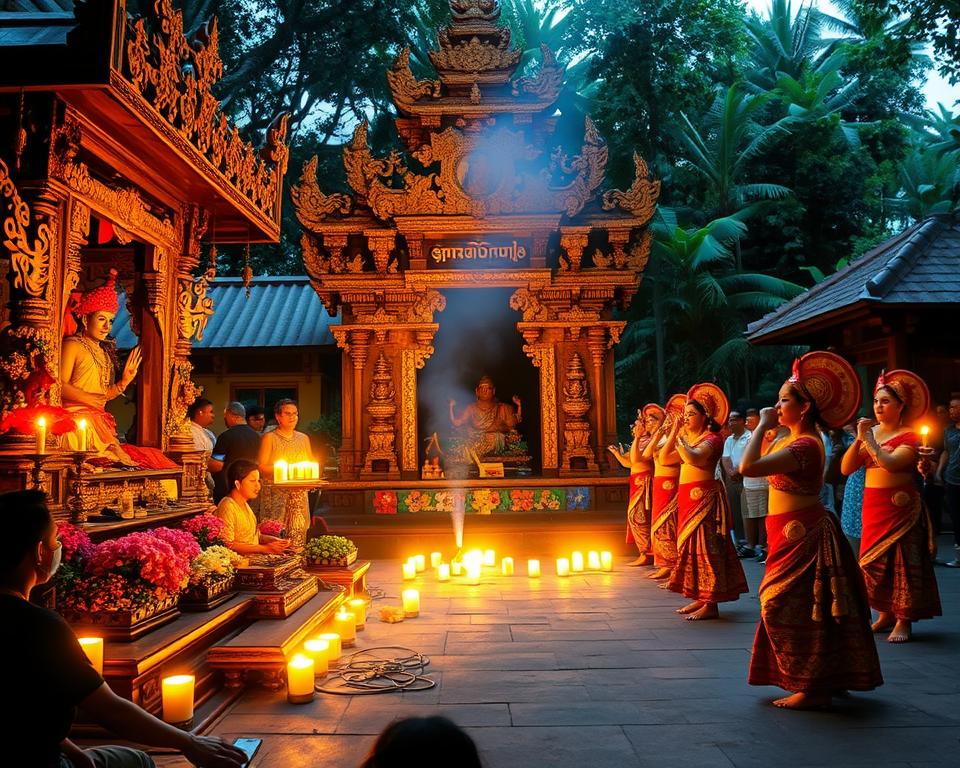
Traditional Ceremonies in Ubud Temples
Bali is famous for its beautiful mountains, beaches, and lakes. But what makes it truly special is its rich culture. This culture is a big part of the Balinese people’s lives1.
Visiting Bali lets you see the colorful ceremonies that are a big part of life here. These ceremonies show the spiritual heart of the island and its old traditions1.
Key Takeaways
- Explore the captivating traditional ceremonies that are central to Balinese culture
- Immerse yourself in the spiritual practices and ancient customs of the Ubud region
- Discover the rich heritage of Balinese Hinduism and its impact on daily life
- Witness the intricacy of dances, offerings, and rituals that celebrate the island’s cultural identity
- Gain a deeper appreciation for the local wisdom and devotion that permeates Balinese society
Immerse in the Sacred Rituals of Bali
Bali’s culture is a big part of daily life. Visiting the island lets you dive into the Balinese Hindu Rituals that have lasted for centuries2. Ubud is the heart of Bali’s culture, where you can see and join in the ancient customs and traditions.
From making sacred temple offerings to watching traditional dances and religious festivals, Ubud’s sacred sites will show you the Balinese way of life. It’s a journey that will deeply move you.
Embrace the Island’s Ancient Customs
Experience Bali’s local wisdom by diving into its cultural immersion chances. See the Balinese Hindu Rituals that are part of Ubud’s cultural heritage. Visit the Tirta Empul temple, founded in 926 A.D., one of Bali’s oldest active temples2.
Also, check out other2 holy water temples in Bali. Places like Pura Ulun Danu at Lake Beratan and Pura Tirta Taman Mumbul at Badung are among the island’s five holiest temples2.
See the spiritual practices of the Balinese by watching traditional dances and religious festivals. Ubud has dances like Barong and Legong and festivals like Galungan and Kuningan. These cultural experiences will stay with you forever.
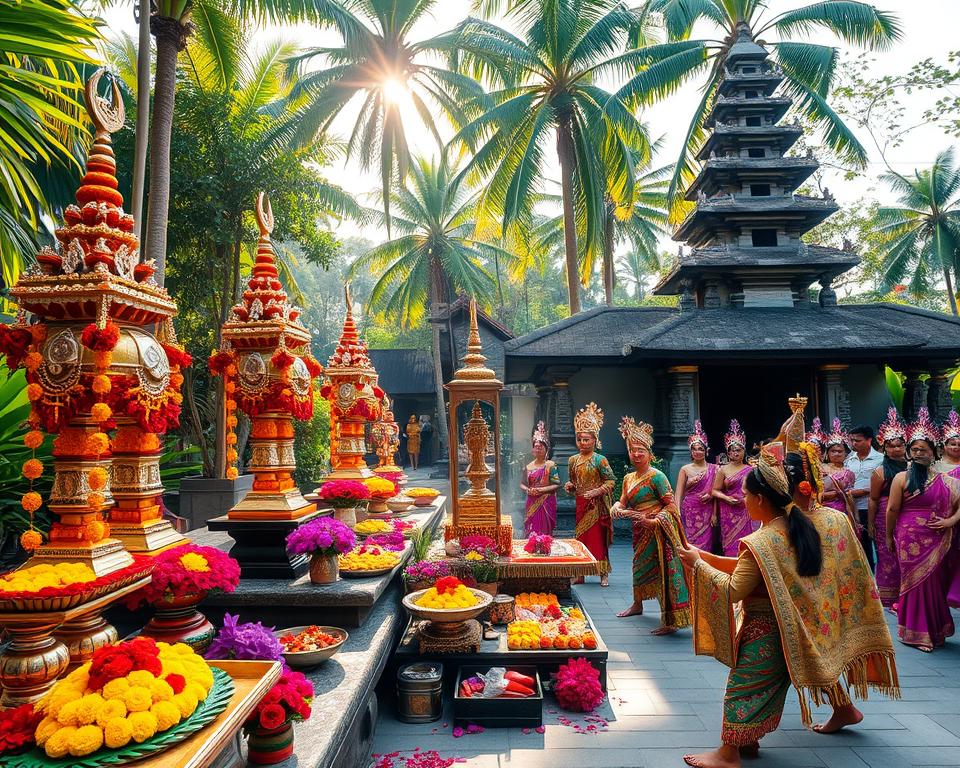
“Bali is a place where the boundaries between the spiritual and the material world are very thin. Everywhere you go, you’ll find evidence of the deep spirituality of the Balinese people.”
Melasti Purification Ceremony
Bali is getting ready for the new year with the Melasti Purification Ceremony3. This old ritual happens a few days before Nyepi. It’s a big deal for the Balinese people3.
Witness the Cleansing of Sacred Objects
The Melasti ceremony cleanses people and temple objects3. Everyone wears traditional clothes. They carry offerings and statues to the coast or rivers34.
People chant and splash in the water. This cleanses them of bad vibes34. They offer fruits, flowers, rice, and symbols to show thanks and respect34.
Deepen Your Devotion to the Hindu Gods
The Melasti is more than just cleaning. It’s a spiritual cleanse for temples4. Balinese Hindus believe temples get dirty over time. Melasti makes them new again4.
By joining, people get closer to their gods. They ask for good luck and safety for the next year4.
The Melasti shows Bali’s love for their culture and nature4. It’s a way to say thanks to the gods and care for the earth4.
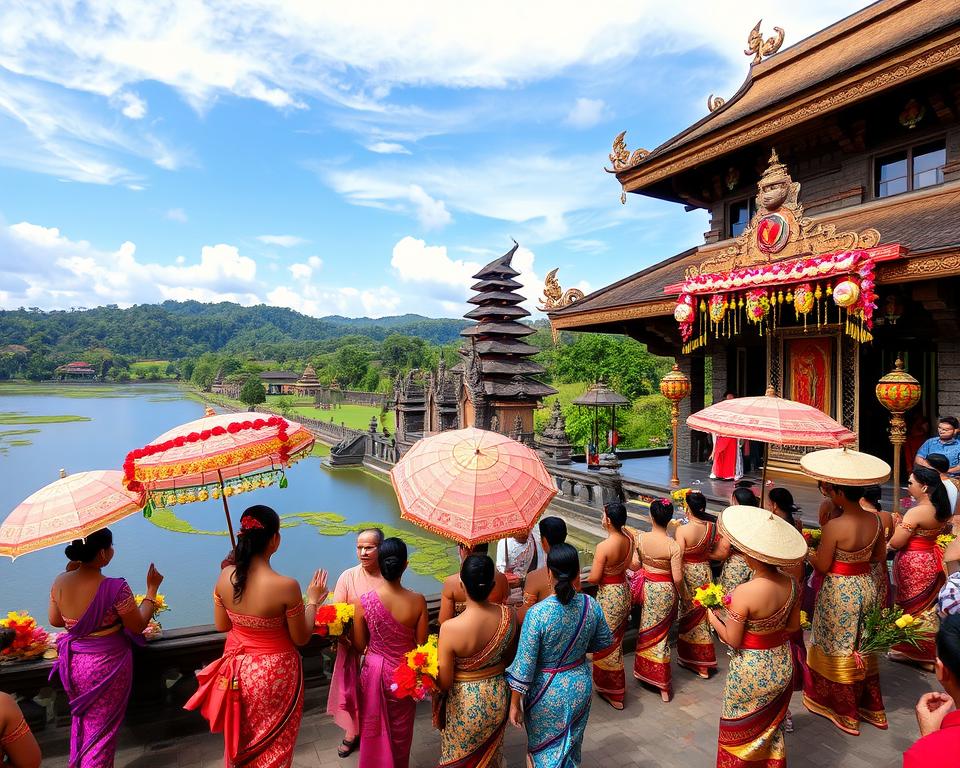
Ngerupuk Ritual: Driving Away Evil Spirits
As Nyepi, the Balinese Day of Silence, nears, the island gets ready for Ngerupuk. This ceremony is to chase evil spirits away and clean the area before a time of quiet5.
The Ngerupuk starts with a parade of big, scary figures called ogoh-ogoh. These are moved through the streets to keep bad vibes away5. The people also do things like spread rice, smudge, light firecrackers, and bang bamboo sticks. They make lots of noise to scare evil spirits5.
This ritual is very important in Balinese Hindu beliefs. It’s about making things pure and keeping good and evil in balance. The Ngerupuk is key to getting ready for Nyepi, a day of silence, meditation, and thinking deeply6.
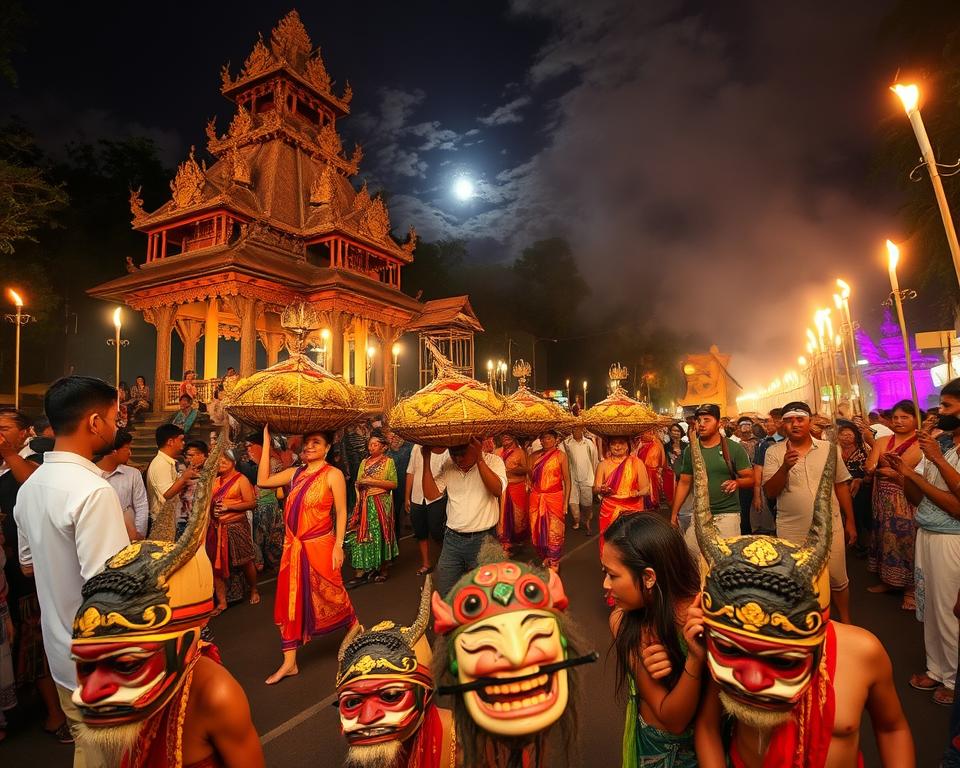
As the sun goes down before Nyepi, the Ngerupuk reaches its peak. The ogoh-ogoh effigies are burned. This act means evil spirits are gone, making way for a calm Nyepi day5.
The Ngerupuk is a beautiful show of Balinese culture and faith. It highlights the island’s deep traditions and its goal to keep peace between the world and the spirit world.
Saraswati Day: Honoring the Goddess of Knowledge
In Bali, Saraswati Day is very special. It celebrates the goddess of knowledge, wisdom, and arts. This festival happens twice a year, on a Saturday and Sunday7.
Celebrate the Wisdom of the Ages
On Saraswati Day, people in Bali worship the Goddess Saraswati. They do rituals in the morning and afternoon7. In Ubud, the Pura Taman Saraswati temple is where people go to seek blessings7.
They make special offerings, like a rice effigy of two geckos. They also do a ritual called Pengelukatan. It’s about cleaning oneself with water for soul purification7.
Experience Enchanting Cultural Performances
At night, Saraswati Day comes alive with dance and stories. Visitors can see Bali’s rich culture and art8. It’s a big event for students and those who want to honor the Goddess of Knowledge8.
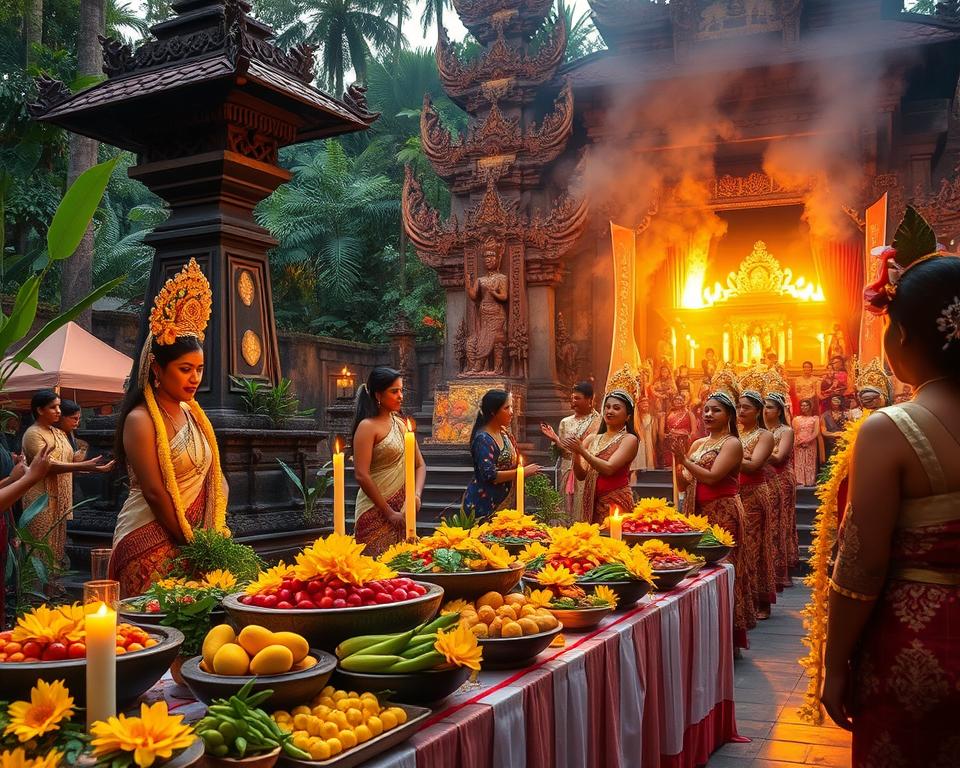
Visiting Ubud? The Pura Taman Saraswati temple is open every day. It’s open from 7:00 AM to 5:00 PM9. You can pray there anytime.
There’s no entrance fee, but there’s a parking fee. Scooters pay IDR 5,000, cars IDR 10,0009. Guided tours are available for a deeper experience. The best times to visit are early morning or late afternoon9.
Galungan: Victory of Good over Evil
Galungan is a special festival in Bali. It celebrates the win of good over evil10. This festival lasts for ten days, showing the victory of dharma (good) over adharma (evil)10.
During Galungan, many ceremonies happen. These include Tumpek Wariga, Sugihan Jawa, and more10.
The Galungan Ceremony is on September 25th, 202410. It’s a time to celebrate the universe and everything in it11. People honor the divine forces and their fight against darkness11.
Kuningan comes ten days later, on October 5th, 202410. It’s a time for ceremonies like Hari Pemacekan Agung10. Galungan and Kuningan are spiritual journeys for Balinese Hindus10.
- Galungan festival in Bali occurs every 210 days, lasting for 10 days, culminating in Kuningan11.
- Galungan festivities in 2024 will run from September 24th until September 26th, ending with Kuningan on October 5th11.
- Penjor poles, prominent during Galungan, are made from bamboo and decorated with coconut leaves, fruit, and flowers11.
- Galungan represents the victory of dharma (good) over adharma (evil) in Balinese Hinduism11.
- Kuningan, which marks the end of Galungan, involves special offerings like yellow rice in coconut leaf bowls11.
- The cultural festival provides tourists with insight into the spiritual and cultural life of Bali, showing traditional practices11.
Galungan is the second biggest holiday after Nyepi in Bali12. It’s a public holiday in Bali12. The day before Galungan, people prepare by slaughtering pigs and setting up “penjor” poles12.
Visitors can see the community getting ready for the ceremonies12. People wear their best clothes and visit temples to pray and make offerings12. They believe this will bring prosperity if the spirits are pleased12.
| Galungan Ceremony | Kuningan Ceremony |
|---|---|
| Celebrates the victory of good over evil | Marks the ascendance of ancestral spirits and seeks blessings |
| Occurs every 210 days in the Balinese calendar | Occurs 10 days after Galungan |
| Lasts for 10 days, culminating in Hari Raya Galungan | Involves special offerings like yellow rice in coconut leaf bowls |
| Involves the erection of decorative “penjor” poles | Coincides with the “piodalan” anniversary at Sakenan Temple |
Traditional Ceremonies in Ubud Temples
Ubud is the heart of Bali’s culture. It has many sacred sites for visitors to explore13. Here, you can learn about the island’s rich culture through ancient rituals in temples.
Explore Ubud’s Iconic Sacred Sites
Goa Gajah and Gunung Kawi are ancient temples to see13. Tirta Empul has holy springs too13. These places show the deep beliefs of Balinese Hinduism.
Visiting these sites lets you dive into Ubud’s culture and traditions13.
Participate in Ancient Hindu Rituals
Joining rituals in Ubud’s temples connects you to the island’s spirit13. Events like Nyepi Day and Galungan are part of Ubud’s culture13. These experiences help you understand the Balinese way of life.
“Participating in the ancient rituals performed at Ubud’s sacred temples offers a profound connection to the island’s spiritual essence.”
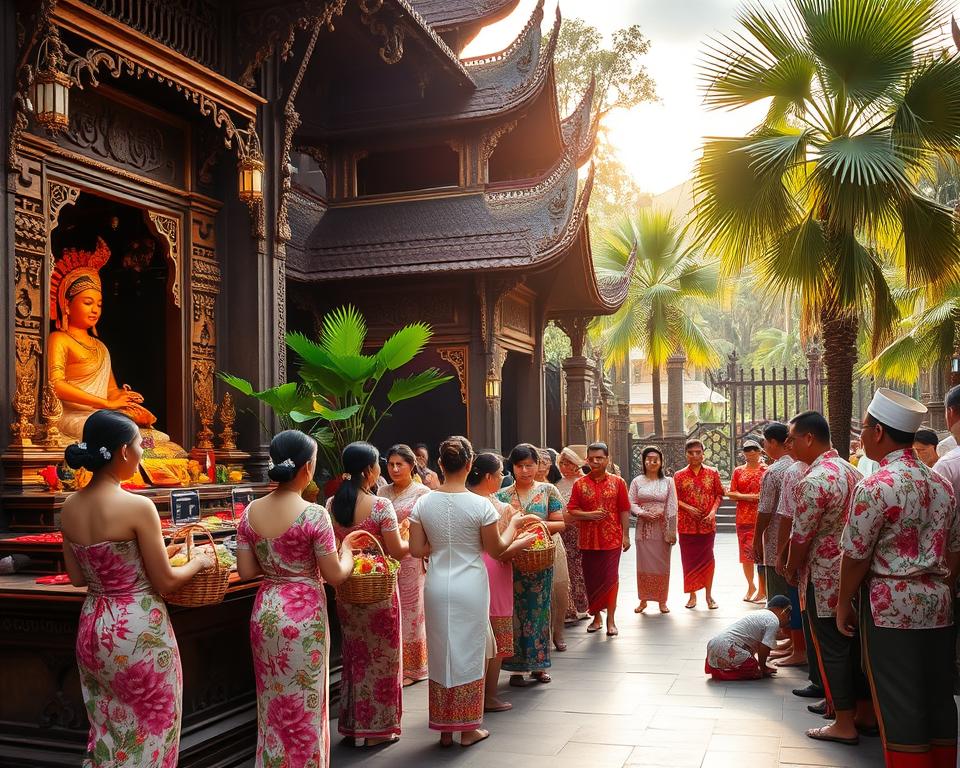
Tumpek Landep: Blessing Weapons and Tools
In Bali, the Tumpek Landep ceremony is very special. It shows how much the island values everyday objects. This ritual happens every 210 days14.
It’s all about making weapons and tools pure and blessed. This is done to bring good luck and safety to those who use them15.
Respected leaders guide the ceremony. It takes place at a temple. There, people pray and give offerings to the gods15.
Purify Objects for Good Fortune
The Tumpek Landep ceremony is based on a deep belief. It says all things, even simple ones, have a spiritual side. By cleaning and blessing tools and weapons, the Balinese keep balance between the physical and spiritual worlds14.
They want their tools to have good energy. This way, they help the community. It shows their respect for tradition and the connection of all things15.
Guided by Respected Traditional Leaders
Respected leaders lead the Tumpek Landep ceremony. They are village elders and spiritual leaders. They make sure the rituals are done with great respect16.
Visitors to Bali can learn a lot from this ceremony. It shows the island’s rich culture and the Balinese’s deep respect for their tools and nature. It’s a chance to see how the spiritual and practical mix, making the ordinary sacred141516.

Mepandes: The Tooth-Filing Ceremony
In Bali, the Mepandes ceremony is very important. It’s also known as Metatah or Mesuguh. This ritual marks a big change for Balinese teens, helping them grow into adults with a clean spirit17.
The ceremony happens when a Balinese child is between 6 and 18 years old. Girls usually do it after their first period17. Some people choose to do it later, like after marriage17. If someone dies without doing it, the family does it before cremation17.
This ceremony is to get rid of bad traits like greed and anger. These traits are seen in sharp teeth called “Sad Ripu.”17 It’s also to make teeth look better, honoring the God of beauty in Bali17.
Planning the Mepandes ceremony takes a lot of work. You need to talk to a priest17. The person lies down with a statue of Dewa Kama while their teeth are filed17. Then, they stay home for three days, eating special foods17.
Long ago, teeth were filed a lot more. Now, it’s a big step in growing up and finding balance17.
“The Mepandes ceremony is a deep way to show the Balinese belief in balance. It’s a special moment in life.”
The Mepandes ceremony is part of Bali’s rich culture18. It lets visitors in Ubud see the spiritual side of Bali18.
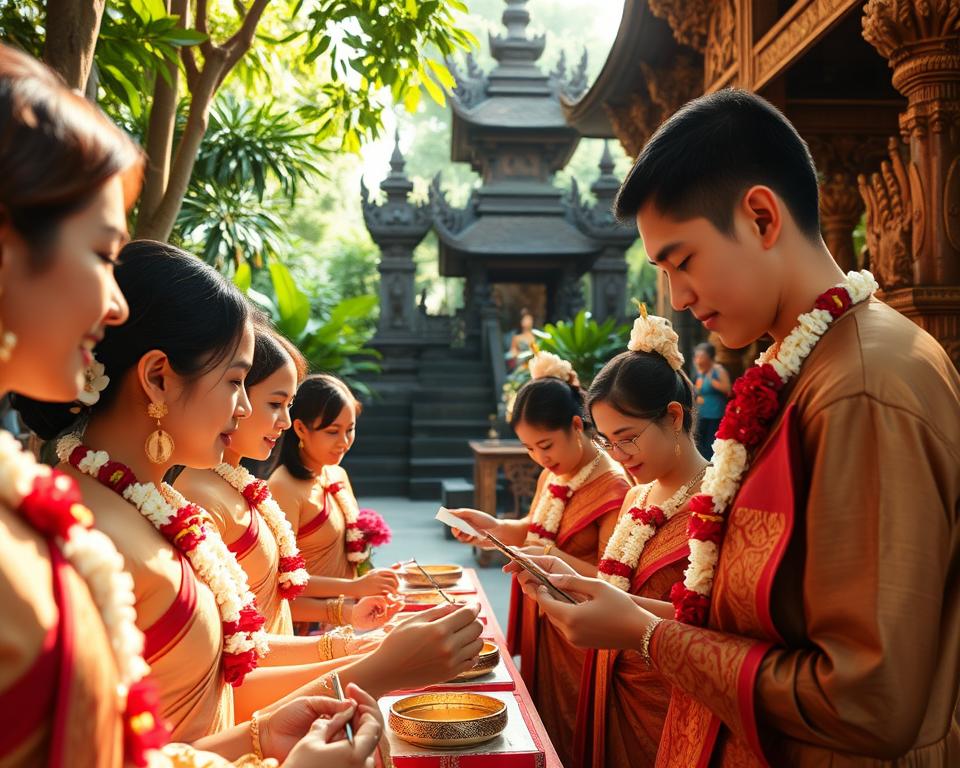
Ngaben: The Balinese Cremation Ritual
The Ngaben ceremony is a special tradition in Bali. It honors the souls of the departed in the Balinese Hindu community19. This ritual means saying goodbye to the body, as the soul is seen as eternal19.
Bid Farewell to Departed Souls
The Ngaben ceremony is a time of joy. Families believe the departed will meet Ida Sang Hyang Widhi after the cremation19. It takes weeks or years to prepare, based on the calendar and family wishes20.
A big parade is part of the ceremony. It’s about 1.3km long20. A huge structure, the Wadah, is carried by men. They change places because of its weight and the distance20.
Experience a Sacred Cleansing Process
The ceremony lasts 2.5-3 hours20. The body is placed in an ox and then burned. This symbolizes the soul’s return to the universe20.
People attending wear sarongs. Taking photos and videos is okay20. Having a local guide can help understand this ritual20.
The Ngaben ceremony is a deep and moving experience. It lets the Balinese Hindu community say goodbye to their loved ones. They also take part in a sacred cleansing process19.
Conclusion
The rich culture of Bali shines through its traditional ceremonies. These are deeply connected to the island’s Hindu beliefs and practices21. From Melasti to Galungan and Saraswati Day, temples in Ubud let visitors dive into the spiritual essence of Bali22.
By joining in these ancient customs and seeing cultural performances, people learn a lot. They get to understand the wisdom and traditions of the Balinese people22.
Visiting the sacred sites of Ubud changes you. It makes you feel closer to Bali’s magic21. You can dive into the Balinese Hindu rituals and learn about Ubud’s cultural heritage23.
This special cultural immersion will make you appreciate Bali’s traditional ceremonies more21.
Start a journey through Ubud’s traditional ceremonies. You’ll find out what makes Bali’s spiritual and cultural identity special22. This magical experience will stay with you and make you feel closer to Ubud’s cultural heritage23.
FAQ
What are some of the traditional ceremonies that can be experienced in the temples of Ubud, Bali?
In Ubud, Bali, you can see many traditional ceremonies. These include the Melasti ritual to purify objects and people. There’s also the Ngerupuk ceremony to keep evil spirits away.
Visitors can also join in Saraswati Day to honor the goddess of knowledge. And there’s the Galungan festival to celebrate good winning over evil.
How can travellers participate in the ancient rituals performed at the sacred sites in Ubud?
You can join in ancient Hindu rituals at places like Goa Gajah and Gunung Kawi. These sites in Ubud let you experience Bali’s spiritual side. It’s a great way to learn about local traditions.
What is the significance of the Melasti purification ceremony in Balinese culture?
Melasti is a key ritual in Bali. It cleanses people and temple objects. It’s a way to show devotion to Hindu gods and care for the environment.
Can you describe the Ngerupuk ritual and its role in the Balinese Day of Silence, Nyepi?
Ngerupuk happens before Nyepi, the Day of Silence. It’s a time to pray and drive away evil spirits. The community uses torches, gunpowder, and loud noises.
They also parade with big demon-like figures called ogoh-ogoh. This prepares for the silent meditation that follows.
How do the Balinese celebrate Saraswati Day, and what is the significance of this holiday?
Saraswati Day honors knowledge and the goddess Dewi Saraswati. The Balinese hold ceremonies to worship her. They pray for learning and offer books and scriptures.
The celebrations include dance and storytelling. They go on all night.
What is the significance of the Galungan ceremony in Balinese culture?
Galungan celebrates good over evil and the creation of the universe. It lasts about 25 days, ending with Galungan Day. The Balinese honor divine forces and their eternal battle against darkness.
What is the purpose of the Tumpek Landep ceremony, and who guides this ritual?
Tumpek Landep purifies weapons and tools through offerings and prayers. It’s led by respected leaders at a temple. The goal is to bless the community’s tools for good luck.
Can you explain the significance of the Mepandes, or tooth-filing, ceremony in Balinese culture?
Mepandes, or Metatah, is a coming-of-age ritual for Balinese children. Their six upper canine teeth are filed down. It removes negative traits like greed and anger.
This ceremony helps the child start adulthood with spiritual purity and balance.
What are the different types of Ngaben ceremonies in Bali, and what is their significance?
Ngaben is a cremation ritual in Bali. It’s a way to return the body to the Creator. There are three types: Ngaben Sawa Wedana, Ngaben Asti Wedana, and Private.
These rituals let the Balinese say goodbye to loved ones and cleanse themselves spiritually.
Source Links
- https://www.viceroybali.com/en/blog/bali-activities/balinese-culture/
- https://www.indonesia.travel/gb/en/destinations/bali-nusa-tenggara/bali/the-holy-springs-of-tirta-empul.html
- https://bali.com/bali/travel-guide/culture/melasti-ceremony/
- https://www.balicasa-properties.com/information/ceremonies/melasti/
- https://wanderluxe.theluxenomad.com/guys-guide-nyepi-101/
- https://www.viceroybali.com/en/blog/bali-activities/nyepi-in-bali/
- https://whatsnewindonesia.com/bali/feature/education/honoring-knowledge-and-wisdom-significance-saraswati-day-bali
- https://www.ubudvillasrental.com/saraswati-a-ceremony-to-goddess-of-knowledge/
- https://balicheapesttours.com/saraswati-temple.html
- https://bisma-eight.com/news/galungan-and-kuningan-festivals-in-balinese-hindu-tradition
- https://bali.com/bali/travel-guide/culture/galungan/
- https://finnsbeachclub.com/guides/bali-galungan-kuningan/
- https://kupubarongubud.com/guide/balinese-culture-religion-gods-and-top-6-most-important-ceremonies/
- https://finnsbeachclub.com/guides/bali-tumpek/
- https://medium.com/@ubud.id/ceremonies-in-bali-island-ubud-004b4b73f5aa
- https://baliartandculture.wordpress.com/2019/08/01/the-top-12-famous-tradition-in-bali/
- https://bali.com/bali/travel-guide/culture/tooth-filing-ceremony/
- https://www.okdiversbali.com/blog/balinese-ceremonies-rituals/
- https://bali.com/bali/travel-guide/culture/balinese-cremation-ngaben/
- https://awaywithanna.com/blog/ngaben-balinese-hindu-cremation-ceremony-as-a-tourist
- https://www.ubudvillasrental.com/balinese-temples-6-things-you-must-know/
- https://meliabali.blog/balinese-culture-dive-into-the-islands-timeless-traditions/
- https://www.asacredjourney.net/divine-destination-bali/